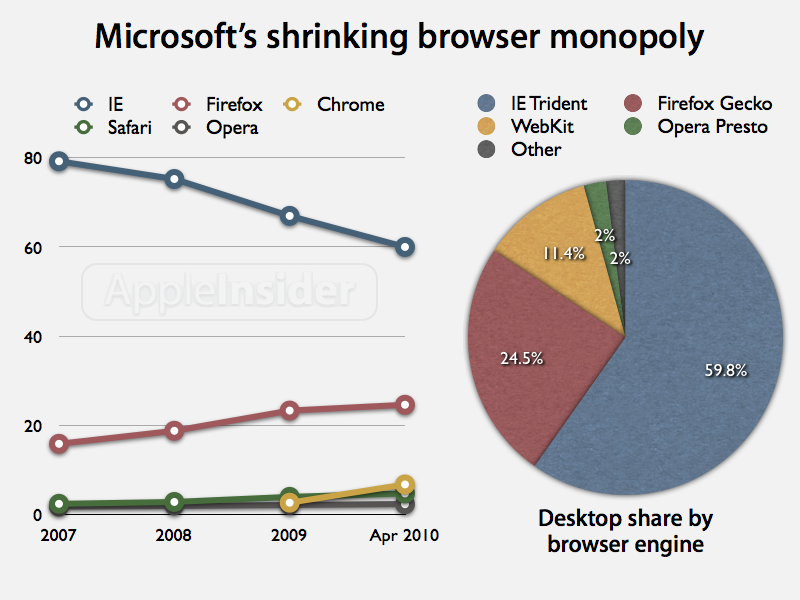According to statistics published by Net Applications, Internet Explorer dipped down to a 59.95% share of its observed traffic, falling from around 80% share in less than two and half years.
Of the 20 lost percentage points, nearly nine were earned by Firefox, which now has nearly 25% share. Another nine were taken by WebKit browsers: two and a half were eaten up by Apple's Safari (to reach 4.72% share), while Google's Chrome expanded to take 6.7% (from zero prior to 2009). Opera gained nearly a percentage point in the same period (to reach 2.3%).
Statistics published by StatCounter were even less flattering for Microsoft's Internet Explorer, which was ranked at a 56.57% share, with Firefox closing in with 31.29%, followed by 5.35% for Chrome, 3.63% for Safari and 2.25% for Opera.
Browser engines
Firefox's Gecko, Opera's Presto, and Safari/Chrome's WebKit engines are all powering the shift away from Internet Explorer and its Trident rendering system, which does not support the latest web standards nor push the envelope in JavaScript rendering speeds as Safari, Chrome, and Firefox have. The next release of Internet Explorer promises to add support for key features of HTML5, and hopes to slow the defection of its user base.
None of the web browser clients are commercial products, so the vendors involved all have alternative motivations for developing them. Microsoft created Internet Explorer to prevent Netscape from offering an open alternative to Windows in developing cross platform apps.
Once Netscape was crushed out of the market, its developers decided to form Mozilla, an open source project intended to continue its development in order to provide an alternative browser not controlled by Microsoft. Mozilla's Firefox rapidly outpaced the development of Internet Explorer, which Microsoft had slowed to a crawl once reaching a monopoly position in browsers around 2000.
In 2002, Apple created a fork of KHTML to deliver WebCore, a fast, clean alternative to Netscape's legacy of Firefox. WebCore served as the foundation for the new Safari browser Apple released in 2003, and was made available as open source. This served both the goal of Apple having its own top tier Mac browser (rather than relying upon Microsoft or an independent open source project to deliver one) as well as the introduction of a high quality, free rendering engine that could help promote the use of open web standards.
In 2005, Apple subsequently announced it would be releasing its entire WebKit browser engine as open source, in addition to the WebCore rendering foundation derived from KHTML. Nokia immediately released a WebKit browser for its S60 smartphone platform. In 2007, Apple released a version of Safari for Windows and a mobile version for iPhone and iPod touch.
In 2008, Google released its Chrome browser using WebKit. Google's Android, Palm's Pre and RIM's upcoming BlackBerry OS 6 all feature WebKit browsers, making Apple's browser strategy wildly effective in promoting open web standards among mobile devices, using open source.
 Prince McLean
Prince McLean







-m.jpg)






 Marko Zivkovic
Marko Zivkovic
 Malcolm Owen
Malcolm Owen


 William Gallagher
William Gallagher
 Amber Neely
Amber Neely
 Sponsored Content
Sponsored Content


-m.jpg)






67 Comments
Wow, congratulations Firefox!
I'm glad competition has come back into the browser market. I'm currently enjoying using Chrome, but think it's neat someone else will probably come up with something better soon.
The next decade should be very interesting. Considering the iPad has such a head start in the marketplace and since it could conceivably become a full blown computer, one could see Safari/ mobile Safari becoming the dominant browser. It would also in turn get the EU or FTC on Apple to allow other browsers and potentially force open the iPhone OS.
The one thing that is abundantly clear is that the MS monopoly is coming to an end. The future is Apple vs Google vs Facebook.
The next decade should be very interesting. Considering the iPad has such a head start in the marketplace and since it could conceivably become a full blown computer, one could see Safari/ mobile Safari becoming the dominant browser. It would also in turn get the EU or FTC on Apple to allow other browsers and potentially force open the iPhone OS.
The one thing that is abundantly clear is that the MS monopoly is coming to an end. The future is Apple vs Google vs Facebook.
it's a pity that the evil that's represented by ie will only be replaced with an even bigger evil which is chrome
those weasels on steroids will be hard to kill
go firefox go!
So if my website (with several thousand visitors a day) shows 60% Firefox users and only 15% Internet Explorer users? does that mean people who read my webcomic are intelligent? Or just that I hate Internet Explorer so much that the site looks like shit in IE and people who use it never come back?
hm